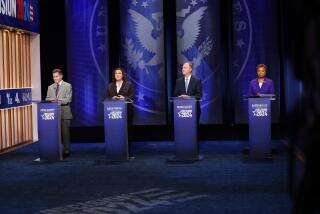McCain Derides Bush, Gore Over ‘Soft’ Money
- Share via
WASHINGTON — Sen. John McCain cautiously criticized George W. Bush on Sunday for failing to join Vice President Al Gore in embracing a challenge to forswear the use of unregulated “soft” money in the upcoming election.
But McCain, speaking on CNN’s “Late Edition,” directed his toughest comments at Gore’s “disgraceful and reprehensible” behavior in chasing so-called soft money for the Democratic ticket during the 1996 election.
His remarks underscore the potential danger that the campaign financing issue poses for both candidates in Tuesday’s presidential debate. Gore is vulnerable because of his association with 1996 campaign finance abuses by his party and Bush is because he opposes the ban of unlimited donations of soft money.
The Arizona Republican’s delicate treatment of Bush’s rebuff indicates that McCain understands the authority he has to call Bush to task--and that he’s hesitant to do so during these pivotal days before the candidates’ first debate.
That unwillingness of McCain, one of campaign finance reform’s poster boys, emphasizes how political considerations protect soft money--the large unregulated checks from wealthy individuals, corporations, labor unions and independent groups--despite all of the campaign rhetoric calling for its abolition.
The parties have raised record amounts of soft money this year. Data released from the Federal Election Commission at the beginning of September showed that the parties already had received $252 million in soft-money donations--$12 million more than they received in the entire election cycle in 1996. And those figures did not include the most recent months.
Last week McCain and Sen. Russell D. Feingold (D-Wis.), the Democratic standard-bearer for campaign finance reform, challenged all candidates for federal office to follow the example of the candidates for the New York Senate seat, Republican Rep. Rick Lazio and First Lady Hillary Rodham Clinton, a Democrat. Following a challenge by Lazio, the two candidates agreed to direct their parties and independent supporters not to use soft money to pay for advertisements that seek to influence the race.
So far, the response to the McCain-Feingold challenge has been slow.
But Gore, who has admitted that he is an “imperfect messenger” for campaign finance reform, wrote McCain and Feingold on Wednesday, saying: “I agree with you that our campaigns should act now, jointly, to end this scourge and clean up the system.
“There really is no excuse for tolerating things as they are, when leaders of both parties could join with you two to change things right now.”
Bush stonewalled, saying he did not trust Gore. He questioned Gore’s credibility on the issue because of his role in the Democratic Party’s 1996 fund-raising abuses, when the Democratic National Committee illegally accepted foreign money and the White House was roundly criticized for offering sleepovers in the Lincoln Bedroom and other privileges for big contributions.
Bush repeatedly has criticized Gore for failing to give adequate explanations for attending a California fund-raising event at the Hsi Lai Buddhist temple in Hacienda Heights, Calif., which led to the conviction of a fund-raiser for illegally disguising donations from that event.
“I didn’t agree with Gov. Bush’s decision, but I also agree with Gov. Bush there is a credibility problem,” McCain said on CNN.
Bush spokesman Ari Fleischer said that the candidate was not fazed by McCain’s comments and suggested that the McCain-Feingold challenge had worked to the Texas governor’s favor. “Any time campaign finance reform comes up, it’s a reminder to the voters about how Al Gore says things he doesn’t mean,” Fleischer said.
For its part, the Gore campaign hasn’t pressed aggressively for the soft-money ban.
“In many respects, the ball is in the governor’s court,” Gore spokesman Chris Lehane said. “Once again, he has shown himself to be a Republican reformer without results.”
Another spokesman, Peter Ragone, predicted the issue would be raised during the debate. “We would hope that the topic of soft money comes up,” he said. “It will give us an opportunity to highlight Vice President Gore’s position on the issue.”
A recent FEC report showed that the Gore campaign had a $10-million advantage of cash on hand over its counterpart. Recent figures are not available for contributions to the DNC, so it is not clear how the party coffers--for soft and hard money--compare.
Meanwhile, in the New York Senate race, the deal between Lazio and Clinton was holding, but on shaky footing. Conservative and liberal interest groups alike appeared to be on the verge of breaking the agreement to weigh in with advertising on the key race.
“We are hopeful but wary in terms of the agreement remaining in force,” Clinton spokesman Howard Wolfson said. “We intend to honor it.”
The agreement applies only to advertising spending, so soft money still is playing a role in the race with get-out-the-vote efforts and other political activities. And both candidates still were raising the funds.
Clinton was in California last week raising soft money for the Democratic Senatorial Campaign Committee, and Lazio reportedly was scheduled to headline a soft-money fund-raiser next week for New York’s state Republican Party.
More to Read
Get the L.A. Times Politics newsletter
Deeply reported insights into legislation, politics and policy from Sacramento, Washington and beyond. In your inbox twice per week.
You may occasionally receive promotional content from the Los Angeles Times.










